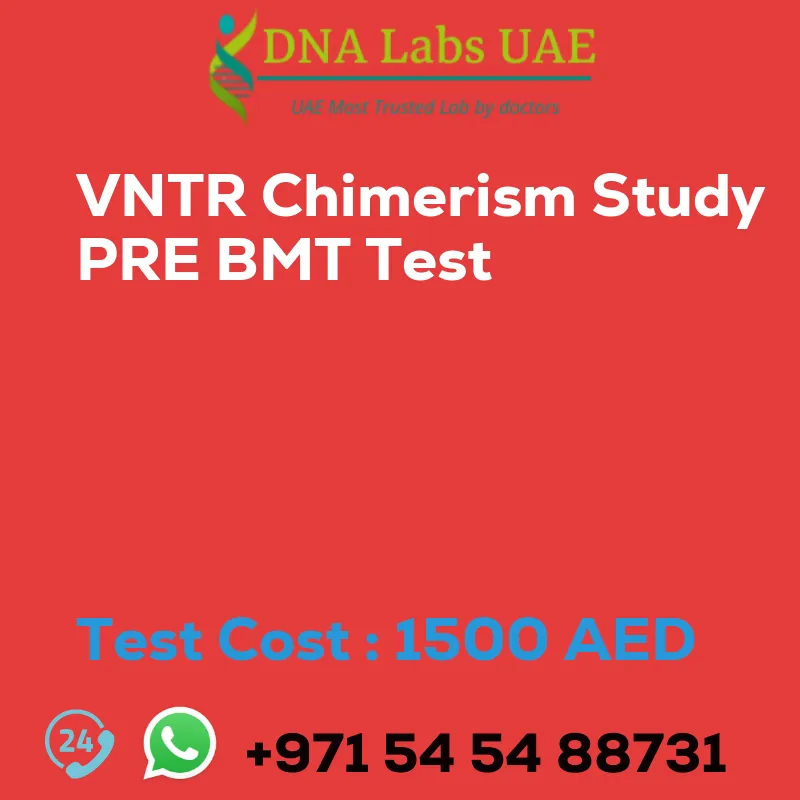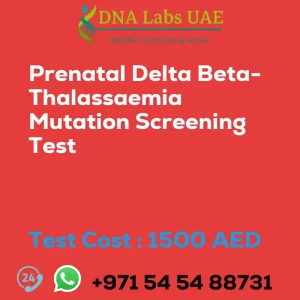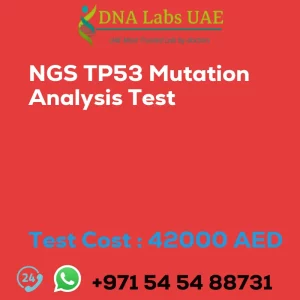VNTR Chimerism Study PRE BMT Test
Cost: 1500.0 AED
Test Name: VNTR Chimerism Study PRE BMT Test
Components: EDTA Vacutainer (2ml)
Sample Condition: Peripheral blood of Recipient before transplant & Peripheral blood of donor
Report Delivery: 3-4 days
Method: End Point PCR
Test type: Genetics
Doctor: General Physician
Test Department:
Pre Test Information: VNTR Chimerism Study PRE BMT can be done with a Doctor’s prescription. Prescription is not applicable for surgery and pregnancy cases or people planning to travel abroad.
Test Details
VNTR chimerism study is a type of genetic analysis used to assess the level of chimerism in patients who have undergone a hematopoietic stem cell transplant, also known as a bone marrow transplant (BMT). Chimerism refers to the presence of two or more genetically distinct cell populations within an individual.
In the context of BMT, chimerism analysis is used to determine the proportion of donor-derived cells versus recipient-derived cells in the patient’s blood or bone marrow. The analysis is based on the Variable Number Tandem Repeat (VNTR) polymorphisms, which are regions of DNA that contain repeated sequences of nucleotides. These VNTR regions are highly variable between individuals, making them useful for distinguishing between donor and recipient cells.
During the VNTR chimerism study, DNA is extracted from both the donor and recipient cells. Specific VNTR markers are then amplified using polymerase chain reaction (PCR) and analyzed using techniques such as gel electrophoresis or capillary electrophoresis. By comparing the sizes of the VNTR fragments from the donor and recipient samples, the proportion of donor-derived cells can be determined.
This chimerism analysis is typically performed before the BMT procedure to establish a baseline level of chimerism in the recipient. It helps to assess the degree of engraftment and monitor the success of the transplant. Regular follow-up chimerism studies are then conducted after the transplant to track the changes in chimerism levels over time.
The results of the VNTR chimerism study provide valuable information for clinicians to adjust the treatment plan, evaluate the risk of graft rejection or graft-versus-host disease, and determine the need for additional interventions.
Overall, the VNTR chimerism study is an important tool in the management of patients undergoing BMT, allowing for the monitoring of the engraftment process and providing insights into the effectiveness of the transplant procedure.
| Test Name | VNTR Chimerism Study PRE BMT Test |
|---|---|
| Components | EDTA Vacutainer (2ml) |
| Price | 1500.0 AED |
| Sample Condition | Peripheral blood of Recepient before transplant & Peripheral blood of donor |
| Report Delivery | 3-4 days |
| Method | End Point PCR |
| Test type | Genetics |
| Doctor | General Physician |
| Test Department: | |
| Pre Test Information | VNTR Chimerism Study PRE BMT] can be done with a Doctors prescription. Prescription is not applicable for surgery and pregnancy cases or people planing to travel abroad. |
| Test Details |
VNTR chimerism study is a type of genetic analysis used to assess the level of chimerism in patients who have undergone a hematopoietic stem cell transplant, also known as a bone marrow transplant (BMT). Chimerism refers to the presence of two or more genetically distinct cell populations within an individual. In the context of BMT, chimerism analysis is used to determine the proportion of donor-derived cells versus recipient-derived cells in the patient’s blood or bone marrow. The analysis is based on the Variable Number Tandem Repeat (VNTR) polymorphisms, which are regions of DNA that contain repeated sequences of nucleotides. These VNTR regions are highly variable between individuals, making them useful for distinguishing between donor and recipient cells. During the VNTR chimerism study, DNA is extracted from both the donor and recipient cells. Specific VNTR markers are then amplified using polymerase chain reaction (PCR) and analyzed using techniques such as gel electrophoresis or capillary electrophoresis. By comparing the sizes of the VNTR fragments from the donor and recipient samples, the proportion of donor-derived cells can be determined. This chimerism analysis is typically performed before the BMT procedure to establish a baseline level of chimerism in the recipient. It helps to assess the degree of engraftment and monitor the success of the transplant. Regular follow-up chimerism studies are then conducted after the transplant to track the changes in chimerism levels over time. The results of the VNTR chimerism study provide valuable information for clinicians to adjust the treatment plan, evaluate the risk of graft rejection or graft-versus-host disease, and determine the need for additional interventions. Overall, the VNTR chimerism study is an important tool in the management of patients undergoing BMT, allowing for the monitoring of the engraftment process and providing insights into the effectiveness of the transplant procedure. |








